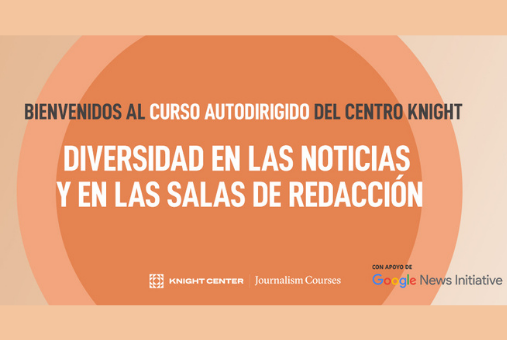
The Knight Center online course in Spanish, “Diversity in the news and newsrooms,” is now available online for free as a self-directed course. Any person from anywhere in the world can now access and take the course at their own pace.
The original version of this course, taught by Peruvian journalist and editor Marco Avilés as a massive open online course (MOOC), was offered from Jan. 11 to Feb. 7, 2021 with support from Google News Initiative. Almost 2,000 students from 50 countries enrolled in the course, with most registrants coming from Peru.
“Diversity in the news and newsrooms is a course that offers ideas, advice, readings, discussions and experiences,” Avilés said. “But above all, it tries to motivate you to take action. That is, to create equitable workspaces and more responsive journalism.”
The self-directed version features video lectures and transcripts from Avilés, interviews with a variety of guest speakers, readings and handouts.
Through this material, Avilés explores how diversity can transform the profession, making it more democratic internally. He shows how this in turn creates relationships with readers. Avilés also gives strategies on how to diversify newsrooms, and offers tools to eliminate racial biases and stereotypes when it comes to coverage.
Weekly modules focus on what diversity means today, myths surrounding the issue, giving the microphone to marginalized communities and going beyond diversity, to report on topics like Black Lives Matter and the removal of controversial statues.
For the course, Avilés interviewed experts, including: Paula Cesarino Costa, the first diversity editor of Brazilian newspaper Folha de S. Paulo; Krissah Thompson, diversity editor at The Washington Post in the U.S.; Keith Woods, chief diversity officer at NPR in the U.S; and Yásnaya Aguilar, linguist, Maya-Mixe communicator and columnist at Spain’s El País.
“This course helps us raise awareness about what diversity is,” a student said through the end-of-course survey. “It also helps us to interact with other people we do not know and share opinions and information on current issues.”
This interaction with other professionals around the world was also a high point for other students.
“It is very pleasant to exchange information with colleagues who experience some similar situations in their professional practice, but also very different ones. They are a window to the world,” another student said. “Thank you for providing this bridge.”
The course’s focus on human rights, justice and diversity enticed Guatemalan journalist Carlos Raúl Kestler to register.
“Last year I finished my degree and did, as my graduation project, a report on how internet platforms fill the gap in the legal apparatus to denounce racism in Guatemala,” Kestler said. “Since then my interest in ethnic-racial diversity in the world (and other types of diversity) has grown.”
As he continues in his journalistic career, he said the lessons learned in the course will help in two specific ways.
“It made me understand how necessary diversity is in journalistic work. If diversity does not exist, we face more obstacles to reflect and explain reality as it is,” Kestler said. “The second is that it allowed me to realize the opportunities that we journalists have to be more precise and consistent with our information. For example, we sometimes talk about how Indigenous peoples are marginalized, but we do not include Indigenous sources in the work or we do not hire Indigenous reporters at the media outlet. I learned that you have to change that.”
To continue conversations around diversity and in newsrooms and news coverage in Latin America, the Knight Center and the Google News Initiative will host the First Latin American Conference on Diversity in Journalism on March 26 and 27. The event is online, open to everyone and registration is now open and free. The two-day conference will feature panels on gender, sexual orientation, race and ethnicity, and disability. Speakers from across the region will participate.

Knight Center for Journalism in the Americas
300 West Dean Keeton
Room 3.212
Austin, TX, 78712
Phone: 512-471-1391
Email: journalismcourses@austin.utexas.edu